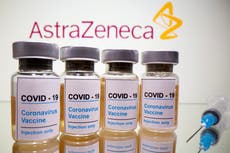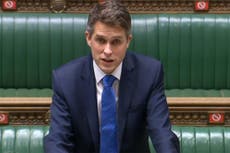‘It cannot be safe’: Teachers baulk at government insistence on reopening schools
One multi-academy trust chief executive says school leaders are ‘deeply conflicted’ at the moment

Your support helps us to tell the story
From reproductive rights to climate change to Big Tech, The Independent is on the ground when the story is developing. Whether it's investigating the financials of Elon Musk's pro-Trump PAC or producing our latest documentary, 'The A Word', which shines a light on the American women fighting for reproductive rights, we know how important it is to parse out the facts from the messaging.
At such a critical moment in US history, we need reporters on the ground. Your donation allows us to keep sending journalists to speak to both sides of the story.
The Independent is trusted by Americans across the entire political spectrum. And unlike many other quality news outlets, we choose not to lock Americans out of our reporting and analysis with paywalls. We believe quality journalism should be available to everyone, paid for by those who can afford it.
Your support makes all the difference.School leaders and teachers have expressed concerns over the planned reopening of schools, as unions called for a delay and councils moved to defy government.
One multi-academy trust chief executive told The Independent that most school leaders were “deeply conflicted”, as they try to balance educating pupils with student and staff safety amid increasing coronavirus rates.
The government has experienced fierce backlash over plans for England’s school return this month, which includes most primary schools reopening from Monday, as the UK faces a highly contagious new coronavirus variant and some of its highest-ever daily case numbers.
Under revised plans for secondary schools, which are preparing to roll-out mass testing, exam years are expected back next week, and all students by 18 January.
Sir Keir Starmer has called on Boris Johnson to scrap these plans and announce the closure of all schools in England in a speech later on Monday.
The prime minister is expected to make an address to the nation at 8pm, when Downing Street said he will unveil “further steps” needed to tackle the Covid-19 crisis.
Pete Bowdery, a teacher from Surrey, told The Independent he believes all schools should stay physically shut for a few more weeks, saying it was a better alternative to disruption faced last term.
“I believe a two to four week lockdown where schools are shut in a controlled and planned manner is far better for children’s progress and mental health than a situation like last term, where entire year groups were sent home with less than three hours’ notice,” he said.
While schools remained open last term, more than half a million state school pupils were off school during the final weeks of term for coronavirus-related reasons, Department for Education (DfE) estimates show.
“The short-term pain of a closure would surely mitigate future pain caused by the hokey-cokey style schooling seen by so many over the last few months," Mr Bowdery said.
Another teacher told The Independent he thought schools should teach virtually until 18 January “at the minimum”, staying open only to children of key workers and vulnerable pupils - who secondary schools are welcoming back in-person this week - and teaching others remotely.
“It cannot be safe to be in school with Year 11s and 13s next week when we are in tier 4,” Luke Stone from Oxfordshire said. “We need time to set up testing stations and this will not be possible before the 18 Jan.”
Another teacher, who wished to stay anonymous, said she thought primary schools across the country “definitely need to close”.
“I don’t think secondary students will be back in two weeks and they shouldn’t be,” she added. “The numbers with Covid are just too high.”
Education unions have called for the government to “pause” the reopening of schools for students other than vulnerable children or key workers’ children.
"Bringing all pupils back into classrooms while the rate of infection is so high is exposing education sector workers to serious risk of ill-health and could fuel the pandemic,” a group of half a dozen unions said on Monday.
The government announced last week that all of London's primary schools would move online from the start of this term, as well as others in some surrounding areas.
Elsewhere in England, some local councils have urged their primary schools to stay shut in defiance of government plans, or said they would individual ones that choose to.
“Most school leaders are deeply conflicted at the moment," Ian McNeilly, the chief executive of the multiacademy De Ferrers Trust, said.
“We do our jobs because we want to educate children and that is best done in school. So, our natural instinct is to remain open and all of the schools in my trust are. However, we cannot ignore increasing Covid rates and we have a duty to protect our staff and children. ”
"We're in a no win situation at the minute.”
Amid concerns over the return to school, the government has insisted schools remain safe and have urged parents to send their children back according to plans.
Speaking on Monday, Boris Johnson said: “I would stress that schools are safe and the risk to kids is very, very small, and the risk to teachers, we're doing everything we can to protect teachers - the risk to teachers is no greater than it is to anybody else in any other line of work.”
However, one primary headteacher told The Independent: “My current stance is that I can't reasonably judge whether it's safe to open schools because the government are not being clear about where the risks are and how they've judged which schools should and shouldn't close."
Michael Tidd, from East Preston Junior School in Sussex, said: “If all the evidence shows that opening schools in most areas wouldn't contribute to significant increases in community transition, then parents and teachers could feel reassured and happily send their children into school.
"While the government fails to provide that evidence, clearly setting out how it is reaching its conclusions about which schools can safely open, they will not garner the confidence of families or school staff.”
Just before Christmas, government scientific advisors warned the R rate may not drop below one even with full lockdown and closure of schools.
Mr McNeilly - who oversees three secondary schools and four primary schools across Staffordshire and Derbyshire - said it would be helpful if individual schools and trust leaders could choose to stick with remote learning for longer than suggested.
“Last time schools tried this because it was the right thing to do in light of increases in local Covid rates, the Secretary of State threatened to sue them,” he said. “That's the support and thanks we get for everything we're going through.”
Several local councils faced pressure from the government to stay open during in the final days of last term - which saw Greenwich issued with a legal direction - after they told schools in the local areas to stop face-to-face teaching early over coronavirus fears.
The DfE have been approached for comment.








Join our commenting forum
Join thought-provoking conversations, follow other Independent readers and see their replies
Comments